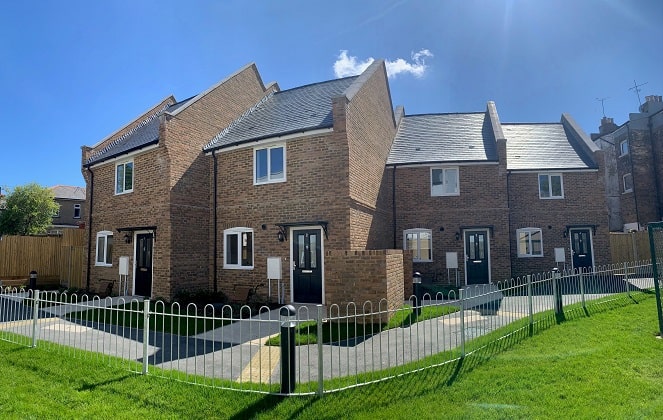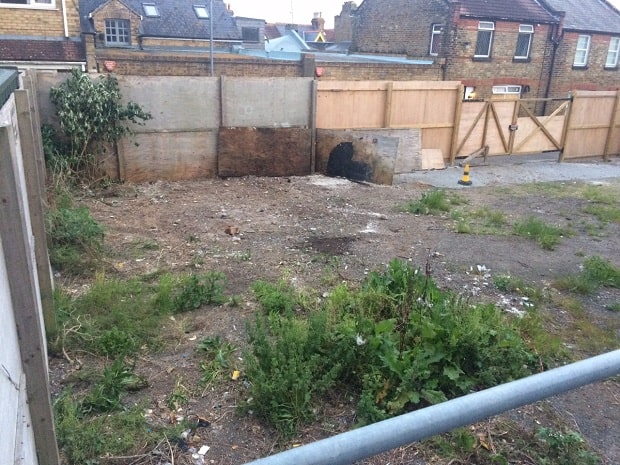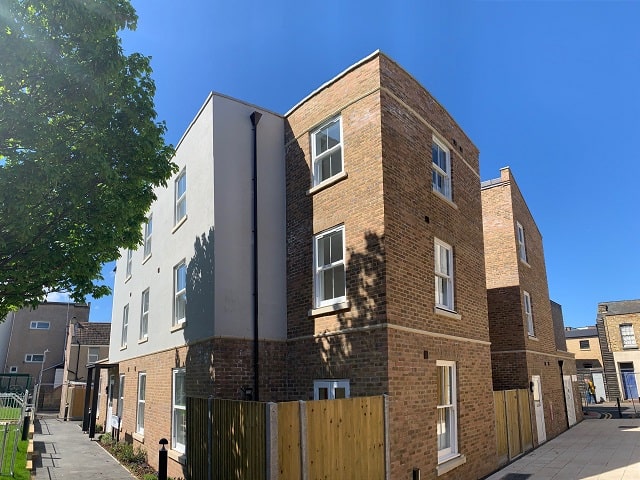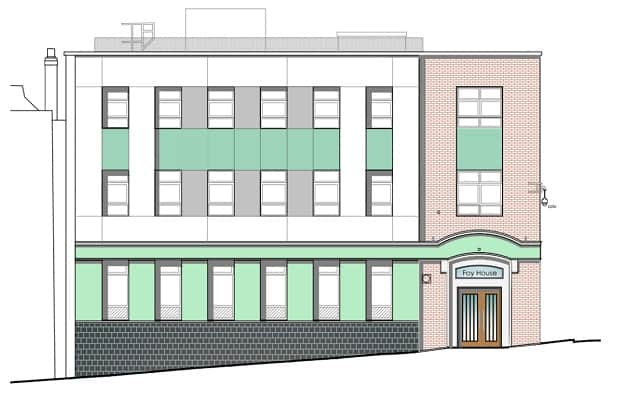
Thanet desperately needs genuinely affordable housing as rises in property prices and private rents outstrip incomes and are not covered by Local Housing Allowance (LHA) rates for people claiming benefits.
Demand is also outpacing supply -data shows that in April 2021, there were 45% fewer homes available to let compared to April 2019.
Many isle tenants in the private sector are spending half their income on rent and 80% of Thanet’s residents are priced out of the market for an average cost terraced home, according to Thanet council statistics.
With 1563 households on the social housing waiting list (as of July 9) and a third of Thanet’s population on a low income – defined as less than £15,988 per year – the need for good standard homes that people can afford is pressing.
For those reliant on LHA the gap between rent and the amount received from the council often means other bills, or even food, have to be sacrificed.
In Thanet the LHA for a two-bed house is £149.59 per week, around £598 per month, but the typical private sector rent according to listings on August 19 ranged from £695 to upwards of £1,200 per month.
Homelessness charity Shelter says in the South East, the average shortfall between a low-income household’s housing benefit and their rent was £138 per month forcing many private renters to cut back on essentials.
District council documents say that 397 affordable homes per year need to be created in Thanet – some 46% of the target 857 new homes per annum. However data in a Kent select committee report on affordable housing shows that in 2018/19 of the 296 additional new homes created in the district just 11 were classed as affordable.
Part of the solution is supposed to be the 30% affordable homes allocation built into housing applications for developments of over 10 properties but some developers get this percentage reduced on grounds that it would make their scheme financially unviable.
And there is the question of whether ‘affordable’ housing really is affordable.
There is no statutory definition of “affordable housing” in England although the government classifies it as at least 20% below local market value for both buying or renting. Social housing – generally council or housing association properties – are typically set at between 50% and 60% of market rent but provision of this housing has been falling for decades.
Kent County Council’s affordable housing select committee says: “The fundamental problem with the Government definition is that it does not take into account the ability of those on low incomes to pay and is therefore not fit for purpose.
“The Government should adopt a definition of genuinely affordable housing which links affordability to income rather than to an arbitrary percentage of market prices.”
Thanet council’s housing strategy documents say high prices and low supply fuel the problems: “Thanet is becoming an expensive place to buy or rent a home for many local residents. High prices are fuelled by low supply, which itself is fuelled by the strength of the second homes economy and in-migration of higher skilled workers.
“For those on low incomes, the housing options are scarce with a reliance on social housing for rent. New ‘affordable rent’ at up to 80% of market rents is increasingly unaffordable to those on low incomes and the council’s Tenancy Strategy limits ‘affordable rents’ for new build homes to the relevant Local Housing Allowance rate to assist with this.
“There is also a growing ‘affordability gap’ where middle income households are being squeezed out of the market; with limited housing options for low cost home ownership or the private rented sector. The difficulties in accessing home ownership and the increasing cost of rental accommodation, is resulting in more employed households making approaches to the council.”
In May former Thanet council member for housing Helen Whitehead wrote to Robert Jenrick MP, then-Secretary of State for Housing, Communities and Local Government: “to explain exactly what we are facing in Thanet; rapid rent increases, and increasing strain on both public and private housing that is not sustainable in the current system.”
She told him: “We need central funding to build the affordable housing we need. And we need long term funding to guarantee the future excellence of a homelessness service that this year finally became a twenty four hour, integrated provision.
Thanet Community Housing land trust
One group aiming to tackle the issue is Thanet Community Housing – a Community Land Trust that was established last year.
The resident-led trust is in negotiations to buy a plot of land in Cliftonville which has planning permission for four family homes and is also in talks with Thanet council about building on land in Minster, off St Mary’s Road, that has planning permission for three small bungalows.
The trust says its homes will be affordable at LHA rates and is hoping to submit a planning application for the Cliftonville site this autumn.

Founding member and trustee Grace Rae said: “Affordable housing is so important, particularly in areas like Margate and Thanet. Lots of people are moving to the seaside and this puts real pressure on the housing stock in Margate and also highlights the need for genuinely affordable housing.
“What’s affordable in London is completely different to what is affordable in Cliftonville.
“We see that as more people arrive here it pushes up prices and pushes out people on low incomes – our specific aim is to step in and meet that need.
“We are going through the process of being a registered provider so we will be letting to people on LHA and relieving that housing need for people on the waiting list. We know there are landlords who refuse to let to people on housing benefit and that is just appalling.”
One important factor in the trust’s plans is the requirement for properties to be low impact, carbon efficient.
Grace said: “Fuel poverty is also a massive problem so we need to have properties fit for the future.”

This aim will be reached through the trust working with R-LA (Ratliff/Landells) architects, based in Northdown Road, who are passive housing certified and have worked on innovative projects such as the Resort building.
According to the Department of Business, Energy & Industrial Strategy, 10.6% of households in the district live in fuel poverty which impacts on their health and well-being. Fuel Poverty is defined by a low income household with high costs. If fuel costs are above average, by paying for that amount, the remaining household income falls below the official poverty line.
The highest concentrations of fuel poverty are in the private sector and are found in wards of Cliftonville West, Margate Central and Eastcliff with excess cold concentrated in the Thanet Villages, Dane Valley and Central Harbour.
Thanet Community Housing hopes to launch consultation and public events from this month and increase membership.
To join costs just £1 and that gives voting rights in the trust’s annual meeting.
Find out more at www.thanetcommunityhousing.org/
How Thanet council is tackling affordable housing need

Thanet council’s build, buy and refurbish programme has moved to phase four with an £8.8million projected spend for up to 36 homes. Since 2015 this programme will have provided 191 new, affordable homes, inclusive of the latest phase. The programme is paid for through the council’s housing revenue account, right-to-buy proceeds and funding from the Homes and Communities Agency (HCA). Phase 3 provided new build homes in King Street and Sussex Street, Ramsgate, which now have tenants.
The redevelopment provided 26 new build units: a mixture of houses and apartments, on parcels of land which had been blocks of garages. The regeneration of the sites was delivered by contractor WW Martin Ltd and was completed in June 2021. All the units were allocated to households with a housing need identified on Thanet District Council’s Housing Register and let at an affordable rent (80% of the market rent).
TDC’s Strategic Housing Manager Ashley Jackson said the authority stepped up the programme after there were no housing association developments in Thanet in 2017.

The council is also progressing with a project to create flats for temporary housing at Foy House in Margate.
The redevelopment of the long-term empty building will create eight self-contained 1 and 2 bedroom flats. Some £1.2million was allocated for the purchase and development, including contingency money.
The refurbished flats will provide temporary accommodation for people and families with urgent housing needs, who are being supported by the council. With 110 Thanet households currently in temporary accommodation the programme is vital.
There are plans for the council to step in and take on affordable home provision when applications for smaller developments of less than 20 homes are made and the authority is also working with Thanet Community Housing.
Ashley said: “In the next few years there are some major sites coming forward with 200-300 units in addition to our own.”
These include modular homes at the Poorhole Lane site in Westwood, a Town & Country shared ownership and rental homes schemes in Cliffsend and in Manston and Minster and Orbit Homes projects in Cliffsend and Westwood. However, some sites coming forward are subject to objections because of development on valuable agricultural land, particularly in Westgate and Birchington.
Homes have also been created through the Live Margate programme and funding has been committed to find more properties in Cliftonville.
But the rising market costs are an issue. Ashley said: “We had a consultation with residents in Cliftonville and a lot felt pushed out and could not afford to live there so we made the area a priority.
“Live Margate is a 10 year programme and we have funds committed to use in Cliftonville but we can’t find anywhere we can afford but we are still looking.”
A new policy will give key workers with housing need a priority status. Plans first mooted in 2019 for the council to create its own housing company to tackle the isle’s homes shortage are also still on the table and shared ownership – where a resident can purchase anything from 25% upwards of their home – is another option the council is examining.

Thanet council’s cabinet member for housing, Jill Bayford, said: “I am very impressed with the commitment of our strategic housing team. There are many challenges to providing the affordable housing we need. It is integral to the wellbeing of individuals to have good quality housing and stability. If anyone can do this, our team will.”
Long-term empty
According to Kent County Council data, Thanet district has the highest number of empty dwellings in the county (2,474 recorded for 2019) This represents 14.3% of the total vacant dwellings in Kent and accounts for 3.7% of the total dwellings in Thanet district
Thanet also has the highest number of long-term empty dwellings (976 in KCC data from 2019, an updated report is yet to be published) . This was 195 more than the previous year (an increase of 25%) the biggest increase seen in Kent. Thanet has the highest proportion of vacant dwellings which are long term empty dwellings with some 39.5% of the vacant dwellings in the district empty for six months or more.
Thanet council says tackling empty homes is a priority. The authority provides informal advice and assistance to the owners of long term empty homes and, while funding remains available, work in partnership with Kent County Council to offer interest free loans to assist owners in bringing long term empty homes back into use. When informal action is unsuccessful, the council will consider taking enforcement action if it has the potential to bring empty homes back into use. This can include serving statutory enforcement notices requiring works to be completed, the undertaking of works-in-default, and taking some of the more significant interventions, such as enforcing the sale of a property, applying for an Empty Dwelling Management Order or making a Compulsory Purchase Order.
Second homes and AirBnB
KCC data shows that as at October 2019 there were 8,755 dwellings in Kent recorded as second homes. This is equivalent to 1.3% of the total dwelling stock in Kent, slightly above the national proportion of 1.0%.
The number of second homes in Kent have fallen by 1.8% since the previous year (-161 dwellings) but overall has increased by 8.0% over the last five years (+651).
Kent coastal authorities have the highest percentage of second homes compared to their total housing stock. In Thanet 2.5% of the total stock are second homes – equalling 1,679 properties, this is followed by Swale 2.4%, Dover 2.4%, Folkestone & Hythe (formerly Shepway) 2.1% and Canterbury 2.0%. In contrast Gravesham (0.1%) and Maidstone (0.3%) had the lowest percentage of second homes relative to existing stock.
There is also a growing Airbnb sector with data from Visit Kent showing Thanet had 1,089 active rentals with a rental growth of 373% between 2016 and 2019.
Thanet council housing documents say:”Thanet has become an increasingly attractive place to live, particularly for retirees leaving London, young professionals purchasing second homes in Thanet and the rise of accommodation being used for AirBnB and short term lets.
“However, this has had a corresponding impact on the local market, where rents have increased significantly at a time of major welfare reform, resulting in more and more accommodation becoming inaccessible and unaffordable to those on low incomes or at risk of homelessness.
Types of affordable housing
Social rent: Provided by local authorities and some registered providers. Social rented properties are the most affordable being approximately 50-60% of private rents and have a secured tenancy agreement.
Affordable rent:. Priced at no more than 80% of local market rent
Build to Rent and Rent to Buy: Property rented for a set period during which time the tenant saves enough for a deposit to purchase the property at the end of the rental term.
Discounted market sales housing: Sold at a discount of at least 20% below local market value.
Starter Homes: Built on brownfield land that is not currently identified for housing with Government scheme offering first-time buyers a 20% discount on the market price. Sale prices are capped at £250,000.
Shared ownership: Households buy a share of the property and the remaining share is rented.
Help to Buy equity loan: Government provides households with an interest free loan of 10% or 20% of the cost of a new home for a period of five years, purchasers require a mortgage and at least a 5% deposit.
Select committee report recommendations include:
- KCC, in consultation with Kent district councils, should develop a proposal for establishing a Housing Growth Unit to accelerate the delivery of housing, and genuinely affordable housing in particular,
- KCC should explore ways of releasing more of its own land for building genuinely affordable housing.
- KCC should assess the feasibility of establishing a joint venture scheme with a partner organisation, such as a housing association or housing development company, to maximise the delivery of new housing and genuinely affordable housing in the county.
- Urge government to do more to ensure that Local Housing Allowance rates cover the cost of private renting, and mitigate any unintended consequences from the abolition of Section 21 (no fault) evictions.
- Amend elements of the current Right to Buy system (council tenants buying their council homes) to promote the replacement and provision of genuinely affordable housing.
- •Ensure that Starter Homes are delivered in addition to, and not instead of, other forms of affordable housing.

